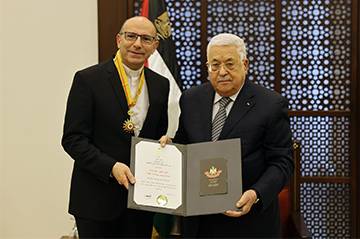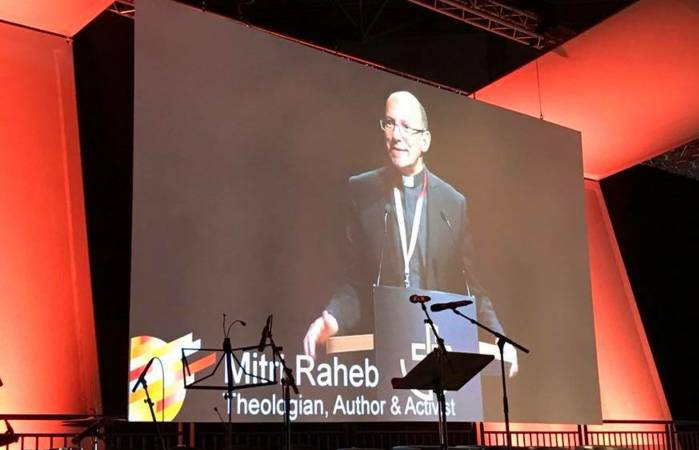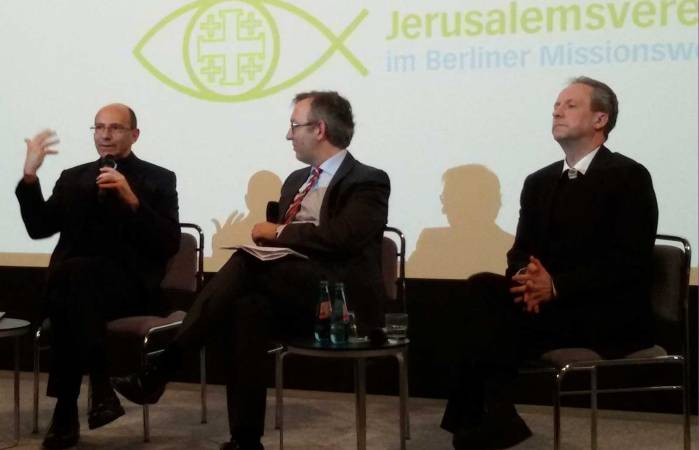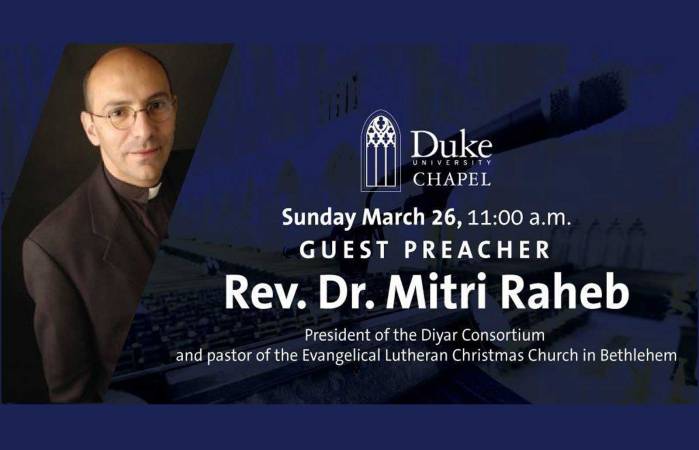LTSP Commencement Speech - Philadelphia
Commencement Speech
Lutheran School of Theology in Philadelphia
Your Excellencies, members of the Board of Trustees, your grace Bishop Burkat, dear President Lose, dear Dean Sebastian, dear faculty members, dear graduates, spouses, parents and friends.
What a special day. This is the day that the Lord has made, let us rejoice and be glad in it. I can feel the excitement, the pride, and the joy of graduates. Finally this day has come. Years of hard work are bearing fruits which shall be harvested. And it is not only your friends, partners, and classmates that are rejoicing with you today, God himself rejoices as well.
What relevant advice can I give you, I who lives thousands of miles away in Bethlehem, Palestine, not Bethlehem, Pennsylvania? What insight can I share with you, after the years you have been studying hard at this prestigious seminary, after you have explored the width and depth of the sacred text and its context then and now? What advice can I give you after you have been trained to assume leadership and to serve God and his people in this world?
After much reflection, I have decided to share with you my story, my personal story. Stories are very important. After all, the bible is nothing but one long story with different episodes. The Bible did not originate in the Bible Belt (thanks God,) but in Palestine. Therefore our story as Palestinians is a continuation of that one long story. And our story have been silenced for too long. Our story has been pushed aside. Our forefathers, faced the recurring empires with their story rather than with weapons."
The story they told was the one story of Jesus that changed the world. So today, I would like to share my story with you. Looking back at almost 30 years in Ministry, I have found three important lessons I learned in life during those years of service in Church and Society that I would like to share with you.
1. I still remember when I graduated from Germany and returned to Palestine. I was the first in our church to get a doctorate, and especially a doctorate from Germany. You can imagine how proud I was. I thought, now I come with all the answers, now I return with great wisdom and knowledge. I returned in May of 1987, and six months later the first Intifada or Uprising began. Clashes between Israeli soldiers and Palestinian kids were happening just outside our parsonage. Church elders were jailed by the Israeli military without trial, members of our youth group were injured, and at several Sundays I had to stop preaching because the sound of shootings behind the walls of our church was loud enough to drown out my voice.
I found myself in a context I was not prepared for. I was not ready for a time like this. I came back with many great answers, but the problem was that no one in Bethlehem was asking the questions to those answers. I had great ideas, but people were not listening to them.
Instead of people listening to me, I had to listen to what people's needs and real issues were" Listening is the most important tool for anyone in Ministry. Listening to what people say or do not say, reading between the lines, and listening with the heart are the most important tools you take with you to the world.
You will be called to serve God in the age of marketing, where people want to sell all kind of things that people need or often do not need. The gospel you will carry with you is not another product you offer to people. You are called to serve and you cannot serve if you do not listen to where people are, what their real needs are, what is bothering, hurting, or exciting them. I wrote several books without listening to where people were. I wrote them with the tools I learned at seminary in Germany. They were good, but I realized later that while writing them I was dancing to the rhythm of 19th century European organ music, while the Palestinian people were dancing to the beat of the drum. It took me several years to figure this out. But I realized that the most important thing I brought from the University were the tools and not the ready answers: the tools to listen, to analyze, to reflect, and to better serve. I realized that the most important training I got at school was not so much the stuff I learned, but the desire to keep learning, to continue working on myself and to go on with developing my listening skills. The art of listening with the heart is the first important lesson I learned and that I hope can be of help to you.
2. I finished University and came back to Bethlehem. I was still 24 years old and had lots of dreams. The reality however was something else--I was asked to serve in my own home church, where I grew up. My predecessor was just elected bishop and the pastoral post there was vacant. The congregation wanted to have me and they are still paying the price of that decision.
Christmas Lutheran was a very small Church that was dying; the church has stopped to be relevant to its members and to the community at large. There was also the political context: the uprising. It was a time of unrest, fear, and upheaval. The challenges were immense. The need overwhelming. And I asked, “Why Lord? Why here? Why now? Why me? I had my own idea, and it was not this call.” And yet, I had no idea what the Lord had in mind for me.
The Lord who taught me to listen, taught me also to see with new eyes. I listened to the need of the people around me. But slowly I started seeing their gifts. They brought with them a wealth of gifts, they were just waiting for someone to discover their gifts, to nurture it, and to put it to work. They were eager to develop their skills, they were eager to be asked to serve, and they were ready to be empowered. I started seeing around me people with immense potential: education, passion, will. They were just waiting to be asked to join, to be of use, and to put their talent into service.
In this context, I learned my second lesson--I learned to see differently. Instead of being paralyzed by the immense challenges, constraints, and obstacles, the Lord gave me eyes to see people with their potentials. Slowly, the focus moved from looking at the challenges to discover the endless opportunities that are there for service and the great potential there is for outreach.
We sit, waiting and hoping for the perfect world, the perfect job, the perfect fit, and so we are blind to the potential that is just waiting to be unlocked. I can tell you from my own experience, that there is no challenge without an embedded opportunity. It is easy to be paralyzed by the immense challenges of this world so that we lose focus. But immense challenges bring with them endless possibilities. All we need are the eyes to see that and to see the potential of people around you and to ask them to join in service.
I always have to remind people that We are not the Messiah. We are not the ones who are going to fix all the problems of this world. If we think this of ourselves, we will burn out. But once we see the potential of others, we can delegate. We can work as a team. We can think together.
I keep reminding our people that it is crucial to know our own calling and what might be the calling of others around us. But the most important thing is to know what is definitely not our calling. Often we are tempted to think that we have to do this and that, to be here and there and everywhere, we have difficulty in saying no because we believe that the world will not be saved without us. But remember that our Messiah came a long time ago, we know this as a fact, because he was born just across the street from where I was born. He accomplished our salvation and that of the whole world. He called us for a very specific Ministry and he is calling all those around us to utilize their gifts to make this world a better place. Nothing more, but nothing less. You need eyes that can, see the potential of people around you, eyes to see the gifts that are waiting to be discovered, nurtured, and called to serve.
3. Twenty eight years ago I started my Ministry as Pastor of Christmas Lutheran Church. Seven years later, we felt a call to reach out beyond the walls of the church to the larger community. Were all the parishioners happy? Not at all. Many were asking “Why bother?” Often congregations wants to be pampered by their pastor. They want all of his or her attention. They ask “Why bother? Why jeopardize the core work of the church with outreach?” But outreach is the core of Ministry.
The church in Bethlehem was dying because the church there stopped reaching out and trying to being relevant to the community. In 1995 we made the decision to start an outreach ministry. I still remember how we started: eight chairs from the fifties, one desk from the sixties, an old typewriter, and 327 U.S. Dollars. What started as a “one man show”-where basically I was both the man and the show-developed to become the third largest enterprise in Bethlehem with over 110 people working, over 2500 members, and 60,000 people participating in our programs every year. In the last 20 years we opened a brand new school, a Conference and Cultural Center, and the first Lutheran University College in the Middle East in the midst of 350 Million Arabic speaking people.
If you would have told me in 1987 how this ministry would grow and expand, I would have laughed like Sara when she was told that she is getting pregnant at the age of 90. The hardest lesson for me to learn was: every time I thought our vision was bold and big, the Lord had to show me it was too small: compared with the need and too small compared with what He had in mind for us. I had to learn to leave room for God in our plans. Because His plans for us are better and greater than what we can imagine, desire, or dream of. We have to leave room for him. This was not always easy. I remember in 2002 when Israel invaded the little town of Bethlehem, when they occupied our center and used it as their military headquarters for three days. And before leaving, they made sure to leave over half a million dollars worth of destruction. What we worked so hard to build in seven years was partly destroyed in three days. There were moments like these when I had to go back to my Lord and say: “Lord look, this was not my idea in the first place, you better figure a way out.” And he did. He never failed us. He gave more than what we could have imagined.
When you graduate and leave this fine institution, be assured that the Lord will be with you at all times. This is my story and my advice: Listen with the heart to where people are! Look for the potential that is waiting to be unlocked! And leave room for God to do his work. He will give you ears to hear, He will give you eyes to see, and He will be there for you at all time. And one last advice: please dare to share your story. Your story is important, it is powerful, and it is a continuation of that one long story.
This is the day that the Lord has made extra for you, we shall rejoice and be glad in it. Congratulations graduating class 2015.



